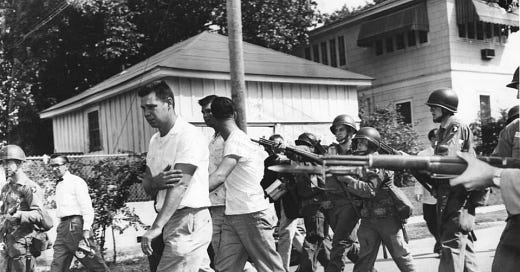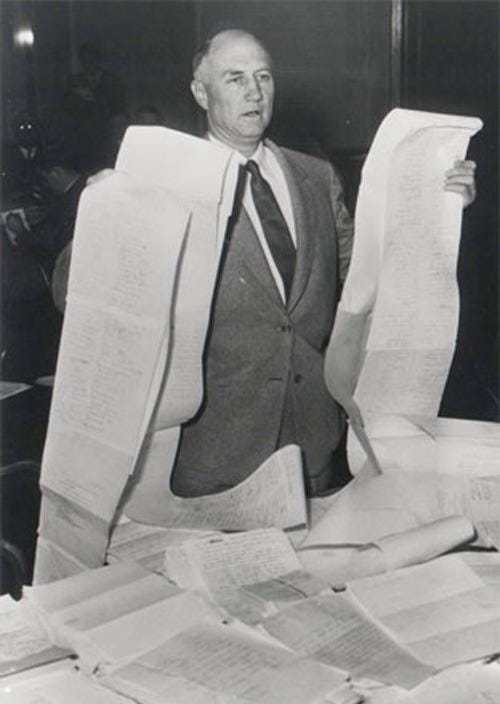American society today is totally structured around the Civil Rights Acts that were forced upon us in the last century. This is no secret, and the talking point is as old as the Civil Rights Acts themselves. Yet to most people, the actual contents of the Civil Rights Acts are an esoteric mystery.
The orthodox history goes, “The Civil Rights Acts ended segregation and voter suppression once and for all1, bringing about integration so that we may all move forward together.” Our counternarrative may sound something like, “Our elites entirely betrayed our people under internal and international pressure and subversion, stripping normal Americans of their liberties and heritage while also paving the way for the disintegration of our nation.”
We’ve all heard both sentiments time and time again, but have you noticed that neither side ever actually says why or how this came to be? Such information may seem much too boring or ancient to give any practical use now, especially so if I start all the way back at the lackluster 1957 Civil Rights Act. But to those few that have read the material, the development of the Civil Rights Regime seems more like an ongoing process than a historical event.
The 1957 Civil Rights Act is comparatively short and to the point, so there are only two things for us to focus on, and we will do so in reverse order. The Act says:
(b) No person… shall intimidate, threaten, coerce, or attempt to intimidate, threaten, or coerce any other person for the purpose of interfering with the right of such other person to vote or to vote as he may choose, or of causing such other person to vote for, or not to for, any candidate… at any general, special, or primary election held solely or in part for the purpose of selecting or electing any such candidate
(c) Whenever any person has engaged or there are reasonable grounds to believe that any person is about to engage in any act or practice which would deprive any other person of any right or privilege secured by subsection… (b), the Attorney general may institute for the United States… a civil action or other proper proceeding for preventive relief…
This is one of the foundational texts that converts the act of voting from being a simple feature of government to being one of the holy sacraments of Democracy, and the language of the law makes as much clear. This is not simply targeting some campaign of voter suppression that existed decades ago. Rather, it is threatening to hit anyone with the full legal strength of the Regime if they dare to even think about corrupting their holy sacrament. One has to simply change the subject matter to be able to clearly see that this is a blasphemy law.
And how is this enforced, exactly? Well, the method may seem very familiar to modern Americans. The Act says:
(a) There is created in the executive branch of the government a Commission on Civil Rights…
(a) The Commission shall—
(1) investigate allegations in writing under oath or affirmation that certain citizens of the United States are being deprived of their right to vote and have that vote counted by reason of their color, race, religion, or national origin…
(2) study and collect information concerning legal developments constituting a denial of equal protection of the laws under the Constitution; and
(3) appraise the laws and policies of the Federal Government with respect to equal protection of the laws under the Constitution.
So, the professional frog-boilers of the Regime have not only written their sacrament into law with the ‘57 Civil Rights Act, but they have also set up a commission to guard this sacrament, with the added ability to perpetuate itself by “uncovering” more issues that it was created to investigate.
The ‘57 Civil Rights Act, though eventually passing without much issue, was famously subjected to South Carolina Senator Strom Thurmond’s day-long filibuster. Every now and then, this fact reemerges in the sphere of pop-history and infotainment, but the content of the filibuster is actually important here. You can read the filibuster for yourself, but to simplify, Senator Thurmond made the case that the ‘57 Civil Rights Act was not only unnecessary, with its provisions being covered by every state’s electoral laws, but that it was also unconstitutional, serving as a stepping stone to completely reshape the country.
And he was right. To simplify, as a result of this oft-overlooked Act, America began marching along the path of dissolution and destruction. And that’s just this first, “simple” piece of legislation.
Unless the media magically finds “segregation” and “voter suppression” during a news cycle, in which case we will forget that the Civil Rights Acts and Voting Rights Acts ever magically delivered progress.






The problem with the unconstitutionality thesis here is that it's obviously wrong. The Fourteenth Amendment clearly authorizes legislation like the '57 Act. The '64 Act was a much bigger stretch.